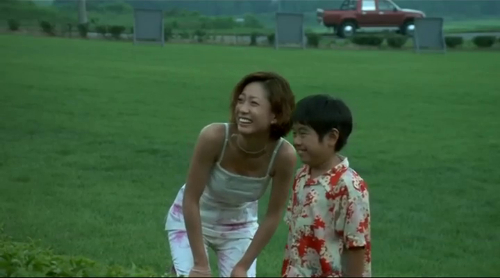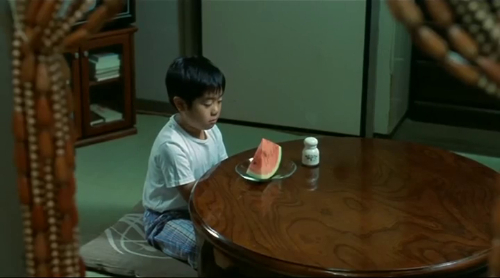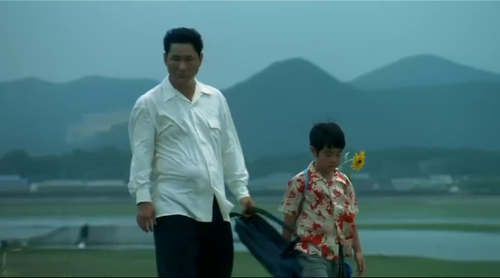
Loners find there’s strength in numbers, in Takeshi Kitano’s low-key comedy-drama.
“Mister. What’s your name anyway?”
“Kikujiro! Now, scram!”
For ten years, between 1989 and 1999, modern day renaissance-man Takeshi Kitano made a number of films designed to distance himself from the comedy persona he had developed since the 1970s. Mostly, these were slow-moving gangster dramas, such as Sonatine, Boiling Point and Hana-bi but he occasionally went into different territory such as with the 1995 sex comedy Getting Any?. The last film in this era – before his international popularity surge thanks to his role in Battle Royale and Brother – was a bit lower-key than that. I’m talking about 1999’s Kikujiro.

In it, Kitano plays the titular character (although his name isn’t revealed for basically the entire film), a good-for-nothing crook who is roped into helping a young boy find his mother. Masao (Yusuke Sekiguchi in one of only two film roles), a lonely kid who lives with his grandmother, is this boy. He has been told his entire life that his mother is working hard for him, far away, and after discovering a photo of her (as well as an address), Masao becomes determined to find her.

Kikujiro and his wife are friends of Masao’s grandmother, and after catching him running away, decide to help. Kikujiro is told to take him to Toyohashi, hundreds of miles away, while the grandmother thinks they’re at the beach. So begins a series of misadventures between the distant Kikujiro and the quiet, shut-in Masao, and the two slowly begin to warm up to each other on their journey, as they encounter people both cruel and kind.

While the overarching plot in Kikujiro is nothing you haven’t seen before, Kitano injects it with a lot of his trademark style. The writer-director uses a lot of what he learnt from his previous films here, and through steady camerawork and simple cinematography is able to capture the essence of the scene perfectly. Here is a man who is at the top of his game, and knows exactly what he’s doing. Unfortunately, there are hints and reminders of Kitano’s better work here – a risk when reusing common elements throughout your filmography. For example, the sequences at the beach, where Kikujiro, Masao, and other characters from their travels all hang out are too reminiscent of Sonatine, which isn’t what you want in a film that simply doesn’t live up to its predecessors.

Still, lesser Kitano is still pretty good – this is before Outrage, after all – and here he uses his central theme of alienation and isolation perfectly. We’re introduced a cavalcade of weird loners, from travelling poets, bikers, that one random banker at the bus stop (played by Kitano’s longtime owarai partner Beat Kiyoshi), as well as the two central characters. The bizarreness of the encounters and the friendliness they offer versus the antagonism from those in more “stable” lives makes the movie feel light-hearted and fun, but there’s a vein of sadness that runs deep in this film.

Whether this comes from Kitano himself, projecting himself into the story, is unsure but the melancholy of the movie is extremely pervasive, from Sekiguchi’s extremely subdued performance to the devastating blow dealt to the protagonists at the film’s halfway point. It’s a theme you’ve seen before – two completely different people come together thanks to hardships – but both Takeshi and Sekiguchi play their diametrically opposed roles with so much conviction that it makes the journey feel a little less samey.

Ultimately, Kikujiro (a still bafflingly-titled film considering this movie is totally about Masao) is a highly pleasant, sweet film that probably works best if you’re new to the whole Takeshi Kitano thing. It’s a decent “starter” film that doesn’t delve too heavily into the overly-violent or silly, and as a result doesn’t leave as much of an impression, but is filled with enough Kitano-isms to satisfy most moviegoers. Add onto it a delightful soundtrack by longtime collaborator Joe Hisaishi, and Kikujiro’s bittersweet story is bound to entertain.
Verdict: Hardly perfect, Kikujiro is nevertheless a solid drama from one of Japan’s most talented individuals.

Overall score: 7/10
Violence: 4/10
Sex: One terribly awkward moment/10
Sadness: 9/10
Sweetness: 8/10
Games: Just who plays Naked Statues anyway?
Kikujiro (1999)
Also known as (菊次郎の夏, : Kikujiro no Natsu, “Kikujirō’s Summer”)
Japanese
Director: Takeshi Kitano
Writer: Takeshi Kitano
CAST
Beat Takeshi – Kikujiro Takeda
Yusuke Sekiguchi – Masao
Great Gidayu – Fatso
Rakkyo Ide – Baldy
Nezumi Imamura – Travelling Poet
Kayoko Kishimoto – Kikujiro’s Wife
Yuko Daike – Satoko Sugiyama
Kazuko Yoshiyuki – Masao’s Grandmother
Beat Kiyoshi –Man at the bus stop
Fumie Hosokawa – Juggler
Akaji Maro – Scary Man
Daigaku Sekine – Yakuza Boss

